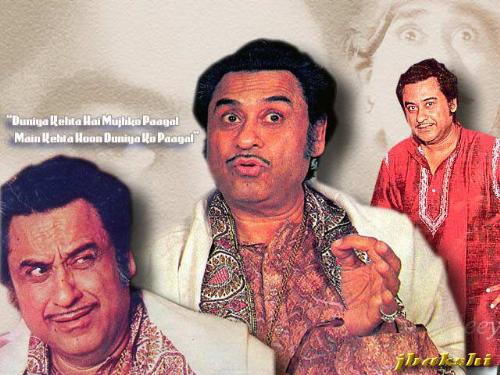GURU STILL ROCKS AND RULES
By jbakshi
@jbakshi (63)
India
November 22, 2006 1:55pm CST
GURU STILL ROCKS AND RULES
Nobody can deny the fact that decades after his death, the magic of Kishore Kumar still remains unbeatable.
.
Raising a huge cloud of dust, the bus from Manali roars into the grimy compound of Pehalwan Dhaba on GT Road. The dawn is breaking over the babool trees fitted with flickering red-and-green tubelights. When the fogged panes of the bus are pushed up, a cold gust sends a shiver through the bus, forcing sleepy eyes open. The fragrance of sweet ginger tea and greasy bread pakoras follows. As hungry souls step down from the bus, a young lad working feverishly over a teapot turns on his brand-new music system. A giant sound box jammed into a neem tree belts out Kishore Kumar's "O Hansini, Meri Hansini". On a nippy morning in the misty northern plains, the song smells like spring flowers dipped in fresh dew. All eyes are awake. All ears are filled with music. Even the Israeli backpackers stop complaining. Kishore's voice washes down the dust from their tired faces. If music is the poetry of the air, Guru's voice is a flame. The voice burns continuously on CD players and iPods and transistors, non-stop across the land: it's played at roadside tea stalls and highway dhabas; people shake their heads and legs to it in college canteens and night clubs; it stirs millions of forgotten memories in private rooms and evokes devotion in Puja pandals; blaring from creaking radios in cabs and autorickshaws, it gives some relief to passengers choking on diesel fumes. HE is all around us. Still. Even in this era of hard-selling clones, meaningless remixes, 24-hour blitzkrieg from the FM and loud-and-lewd Punjabi pop, Kishore Kumar rocks and rules the world of Hindi music.
.
They have remixed him; They have mixed his voice with reggae beats; They have tried to wrap his voice with funky guitar strings; They have tried to add disco echo to his yodel-o, yodel-o yo-o, but they haven't dared to touch his original tracks of haunting melodies: the songs of life and letters penned by Gulzar, the tunes of love and despair set by R. D. Burman. Kishore and RD are still the kings of jukebox. The DJs live off them. The FM channels play other music in breaks between KK-RD numbers. Guru's "Pyaar Deewana Hota Hai" and "O Mere Dil Ke Chain", two eternal love songs, still make people in the mood for love go wobbly. The sensuous sadness of "Dukhi Mann Mere" still makes the pain arrive in lilting notes. The breezy carelessness of "Chala Jaata Hoon Kisee Ki Dhun Mein" still makes people believe in love. The crazy energy of "Eena Meena Deeka" still makes people caught in the drudgery of life let their hair down. Guru's voice is an experience. He articulates our thoughts; He gives wisdom to our emotions. They say he was not the greatest singer. They say Rafi was more versatile. Probably. Rafi's voice moved like a gentle wind over the deep yellow mustard fields of Punjab. Talat Mehmood carried his velvety voice with the old-style grace of feudal India. Mukesh's sad voice captured the agony of the tramp hanging out on a Bombay footpath. Manna Dey was both classical and rustic. Then arrived Kishore Kumar with a whiff of freshness. He was melodious and vibrant. He was sensitive and intoxicating - and he was an untrained singer. He became the voice of city slickers - ambitious in life, romantic at heart, carefree in attitude and gloomy in despair. His songs have defined generations. His voice still guides generations. It’s difficult to think of life without HIM - the GOD OF MELODY; Without Kishore Kumar, life may not be a mistake, but it will definitely be incomplete.
1 person likes this
1 response






